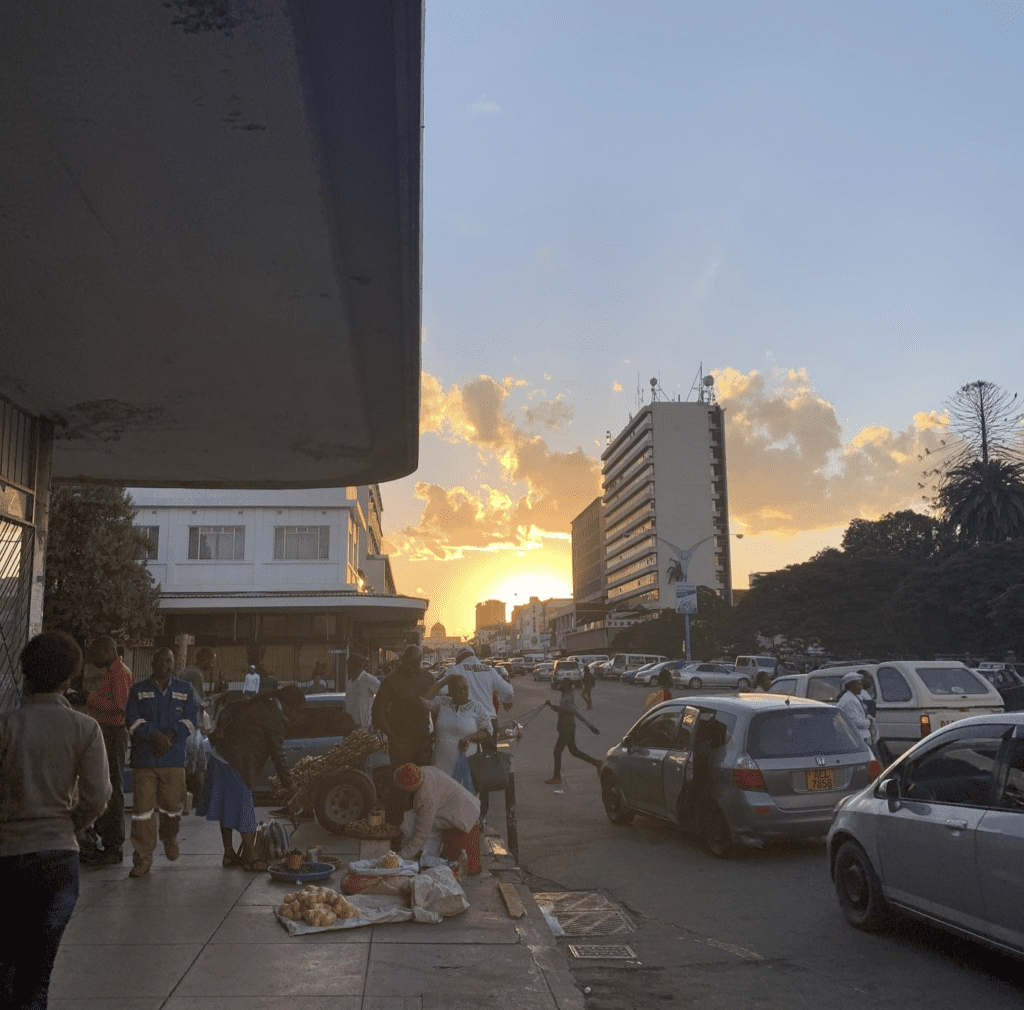Disabled vendor defies odds and survives Covid-19 lockdown
For the past 15 years, Sibongile Moyo has been selling sweet potatoes, Irish potatoes and other vegetables to earn a living for herself and her five children. Moyo, who is disabled and uses a wheelchair, is one of the many informal traders who operate in the city’s streets.
“I started vending in 2006 after I was involved in a car accident that left me paralysed from the waist down. I had no other source of income and I had to take care of my children who were still young. I decided to venture into vending because it was the only option I had,” she said.
Moyo said she usually buys her produce from farmers nearby and transports them to the city using public transport. She then sells them at various locations, depending on where she can find customers.
“I sell my vegetables at different places, sometimes near the market, sometimes near the bus terminus, sometimes near the shops. I have to move around because there is a lot of competition and also because the council does not allow us to sell at one place for too long. They say we are illegal vendors and they confiscate our goods if they catch us,” she said.
Moyo said she faces many challenges as a disabled vendor, such as lack of capital, lack of access to sanitary facilities, harassment from council officials and other vendors, and health problems.
Day-to-Day Struggles
“Sometimes I don’t have enough money to buy stock or to pay for transport. Sometimes I get sick and I can’t work. Sometimes I face discrimination and abuse from other people who look down on me because of my disability. Sometimes I have to sleep on the streets because I can’t afford to go back home,” she said.
Moyo said the Covid-19 pandemic has worsened her situation, as it has affected her sales.
“When the lockdown started last year, I could not work at all. I had no income and no food. I had to rely on donations from well-wishers and NGOs. It was very hard for me and my children. We almost starved,” she said.
Moyo said she resumed vending after the lockdown restrictions were eased, but she had to change her strategy to cope with the new situation.

“I realised that I could not sell in the streets anymore because there were fewer people and more police. So I decided to do door-to-door selling using my wheelchair. I would go around the neighbourhoods and offer my vegetables to people who were at home. It was not easy, but it was better than nothing,” she said.
Support Needed
Furthermore, Moyo said she hopes that the government will support disabled vendors like her by providing them with vending spaces, loans, grants, training and equipment.
“I wish that the government would recognise us as legitimate traders and give us some assistance. We are also citizens who have rights and needs. We are also contributing to the economy and society. We are not begging, we are working hard,” she said.
Moyo said she also hopes that the Egodini Mall project, which has been stalled for years, will be completed soon and that it will accommodate disabled vendors.
“I have heard that they are building a big mall at Egodini where there will be shops, offices, banks, restaurants and other facilities. They say it will be a modern and beautiful place. I hope that they will also reserve some space for us disabled vendors who have been working at Egodini for a long time. We also deserve a chance to benefit from this development,” she said.
RELATED CONTENT: Overcoming Disability Through Sustainable Agriculture.
Pride With Her Successes
Moyo said she is proud of her work and her achievements despite her disability and her challenges. She said she has managed to send her children to school and to provide them with basic needs.
“I am happy that my children are doing well in school. They are my motivation and my joy. They always support me and help me with my work. They say they want to make me proud and they want to have a better life than mine,” she said.
Moyo said she wants to inspire other disabled people to work hard and not to give up on their dreams.
“I want to tell other disabled people that disability is not inability. We can do anything we set our minds to. We should not let our disability define us or limit us. We should not let other people’s opinions or attitudes affect us. We should be confident and courageous. We should be independent and productive. We should be happy and hopeful,” she said.
According to the Zimbabwe National Disability Board (NDB), there are about 1.4 million people with disabilities in Zimbabwe, representing about 10 percent of the population. The NDB is mandated to support the Ministry of Public Service, Labour and Social Welfare in coordinating disability affairs in Zimbabwe.
National Disability Policy
In June 2021, President Emmerson Mnangagwa launched the National Disability Policy, which seeks to address the marginalisation and discrimination of persons with disabilities, empower them to improve their own quality of life and enable them to contribute to the national development agenda. The policy sets standards for the inclusion of persons with disabilities in all facets of life, including employment, education, health, housing, transport and social protection.
The policy also aims to domesticate the provisions of the Convention on the Rights of Persons with Disabilities, which Zimbabwe ratified in 2013. The convention is an international treaty that protects and promotes the rights and dignity of persons with disabilities.
However, despite the existence of the policy and the convention, many persons with disabilities in Zimbabwe still face challenges such as poverty, exclusion, stigma, abuse and lack of access to services and opportunities. Many of them resort to informal trading as a means of survival, but they often encounter barriers such as lack of capital, lack of space, lack of protection and lack of support.
Moreover, one of the long-awaited projects that is expected to benefit persons with disabilities in Bulawayo is the Egodini Mall project, which is a US$60 million redevelopment of the Basch Street bus terminus into a state-of-the-art multi-purpose complex. The project, which is being undertaken by Terracotta Trading Limited (TTPL), a South African company, under a Build Operate and Transfer (BOT) deal, started in 2018 and was supposed to be completed by 2020.
RELATED CONTENT: Grow and Formalise Informal Sector
Stalled Project
However, the project has been delayed by various factors such as economic challenges, Covid-19 pandemic, legal disputes and contractual issues. The project has also been met with resistance from some local vendors and residents who have accused TTPL of being insensitive to their needs and interests.
The project is expected to create over 2000 jobs and accommodate over 1000 vendors, including disabled vendors who have been operating at Egodini for years. The project is also expected to improve the transport system, the business environment and the urban aesthetics of the city.
However, until the project is completed and operationalised, disabled vendors like Moyo will continue to face uncertainty and hardship as they strive to make ends meet in the midst of a pandemic and a crisis.
#News in Bulawayo #News in Zimbabwe Artist Arts BCC Bulawayo Bulawayo City Council Bulawayo economy Bulawayo industry Bulawayo news Bulawayo Police Bulawayo Water Bulawayo Water Crisis Bulawayo Women entrepreneurship Business Women Cholera Community Culture Currency Drug Abuse Drugs Economy Farmer Farmers Farming Informal Sector Informal Traders Mining MSMEs Music News in Bulawayo News in Zimbabwe Police Police in Bulawayo Vendor Vendors water Water Crisis Water Shortage water supply issue Women entrepreneurship ZESA Zimbabwean economy Zimbabwe news Zimbabwe water crisis ZRP
Our stories told by us!
Join us for all News in Bulawayo and Bulawayo News in Zimbabwe.












